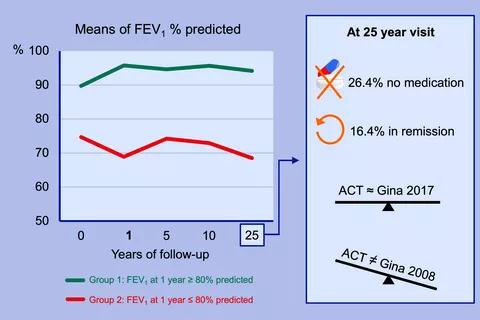Release date:2020-04-30

Allergy
[IF:6.048]
The first year of treatment predicts the prognosis of asthma over 25 y—A prospective studyDOI: 10.1111/all.13983
Abstract:
Background: An investigator‐driven, real‐life follow‐up study of adult‐onset steroid‐naïve, newly diagnosed asthma (162 patients) to investigate the treatment results over the 25‐year course of the disease and whether the first treatment year's forced expiratory volume in one second (FEV1) predicts the long‐term prognosis.
Methods: Eighty‐three per cent of the 133 living patients participated in the 25‐year examinations. At this visit, basic asthma examinations including lung function, as well as questionnaires for health‐related quality of life (HRQoL), GINA and the Asthma Control Test, were used for evaluation. The use of medication and remission was verified.
Results: There was no statistically significant change in mean FEV1% predicted (FEV1%) from baseline to the 25‐year control. The changes in FEV1% during the first year predicted the results at the end of follow‐up. Normal FEV1% at the end of the first year predicted normal FEV1, and below‐normal FEV1% at 1 year predicted below‐normal FEV 1% at 25 years. Twenty‐nine patients (26.4%) had discontinued their medication, and six (5.5%) used ICS periodically. Clinical remission was reached by 16.4% of the patients, and 7.6% reached functional remission. The general HRQoL remained unchanged.
Conclusion: In adult‐onset asthma, the level of FEV1 reached during the first treatment year seems to predict the later lung function level. One quarter of the patients discontinued the asthma treatment, but their HRQoL was better than that of those continuing to use ICS. Clinical remission was reached by 16% of the patients, which is in concordance with other studies.
First Author:
Ritva Kauppinen
Correspondence:
Jouni Hedman, Department of Pulmonary Diseases, Valto Käkelänkatu 1, 53130 Lappeenranta, Finland
All Authors:
Ritva Kauppinen, Vesa Vilkka, Harri Sintonen, Jouni Hedman
2020-01-18 Article
开云电子(中国)官方网站 | 华亿首页(中国)网页版 | 开云网页版 | 天博手机网页(中国)有限公司 | 千亿体育线上平台中国有限公司 | 米兰手机在线登入 | 米乐官方网页版 | 华亿网页版 | 三亿体育首页(中国)网站首页 |
 华亿体育(中国)游戏平台
华亿体育(中国)游戏平台
